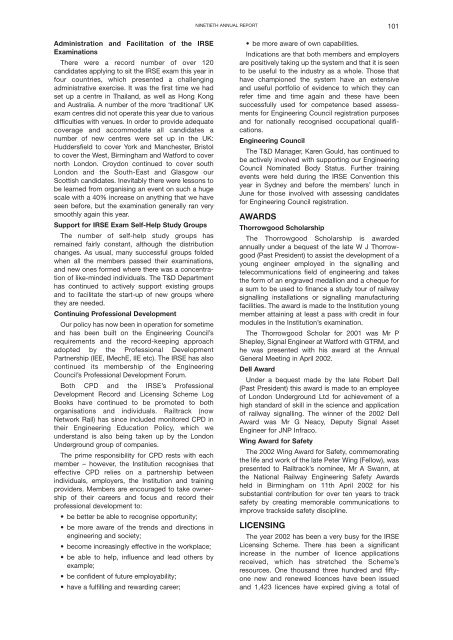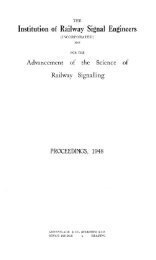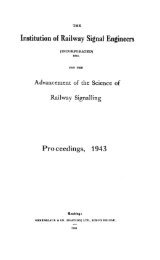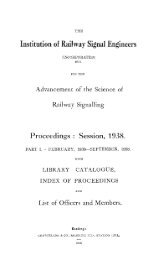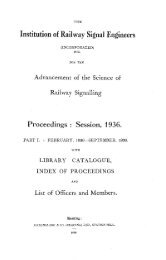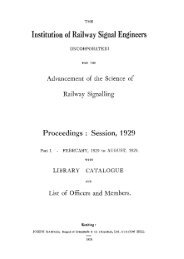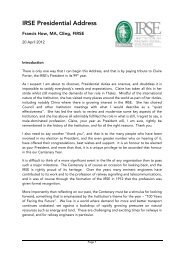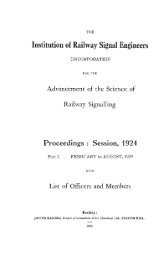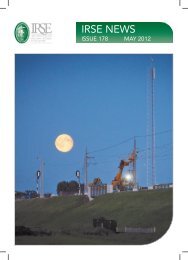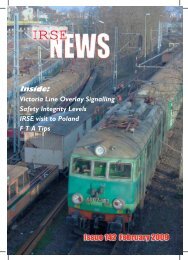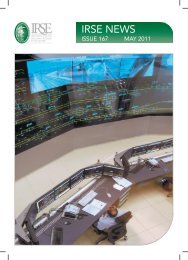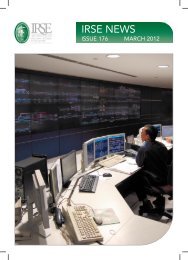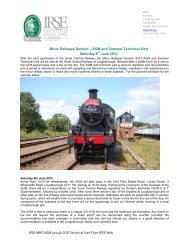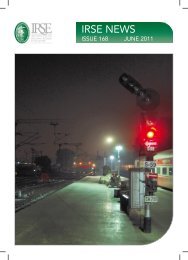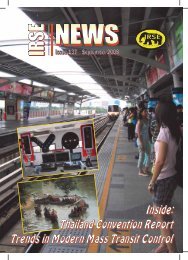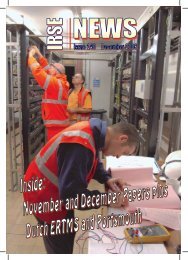Proceedings 2002/2003 - IRSE
Proceedings 2002/2003 - IRSE
Proceedings 2002/2003 - IRSE
You also want an ePaper? Increase the reach of your titles
YUMPU automatically turns print PDFs into web optimized ePapers that Google loves.
NINETIETH ANNUAL REPORT 101<br />
Administration and Facilitation of the <strong>IRSE</strong><br />
Examinations<br />
There were a record number of over 120<br />
candidates applying to sit the <strong>IRSE</strong> exam this year in<br />
four countries, which presented a challenging<br />
administrative exercise. It was the first time we had<br />
set up a centre in Thailand, as well as Hong Kong<br />
and Australia. A number of the more ‘traditional’ UK<br />
exam centres did not operate this year due to various<br />
difficulties with venues. In order to provide adequate<br />
coverage and accommodate all candidates a<br />
number of new centres were set up in the UK:<br />
Huddersfield to cover York and Manchester, Bristol<br />
to cover the West, Birmingham and Watford to cover<br />
north London. Croydon continued to cover south<br />
London and the South-East and Glasgow our<br />
Scottish candidates. Inevitably there were lessons to<br />
be learned from organising an event on such a huge<br />
scale with a 40% increase on anything that we have<br />
seen before, but the examination generally ran very<br />
smoothly again this year.<br />
Support for <strong>IRSE</strong> Exam Self-Help Study Groups<br />
The number of self-help study groups has<br />
remained fairly constant, although the distribution<br />
changes. As usual, many successful groups folded<br />
when all the members passed their examinations,<br />
and new ones formed where there was a concentration<br />
of like-minded individuals. The T&D Department<br />
has continued to actively support existing groups<br />
and to facilitate the start-up of new groups where<br />
they are needed.<br />
Continuing Professional Development<br />
Our policy has now been in operation for sometime<br />
and has been built on the Engineering Council’s<br />
requirements and the record-keeping approach<br />
adopted by the Professional Development<br />
Partnership (IEE, IMechE, IIE etc). The <strong>IRSE</strong> has also<br />
continued its membership of the Engineering<br />
Council’s Professional Development Forum.<br />
Both CPD and the <strong>IRSE</strong>’s Professional<br />
Development Record and Licensing Scheme Log<br />
Books have continued to be promoted to both<br />
organisations and individuals. Railtrack (now<br />
Network Rail) has since included monitored CPD in<br />
their Engineering Education Policy, which we<br />
understand is also being taken up by the London<br />
Underground group of companies.<br />
The prime responsibility for CPD rests with each<br />
member – however, the Institution recognises that<br />
effective CPD relies on a partnership between<br />
individuals, employers, the Institution and training<br />
providers. Members are encouraged to take ownership<br />
of their careers and focus and record their<br />
professional development to:<br />
• be better be able to recognise opportunity;<br />
• be more aware of the trends and directions in<br />
engineering and society;<br />
• become increasingly effective in the workplace;<br />
• be able to help, influence and lead others by<br />
example;<br />
• be confident of future employability;<br />
• have a fulfilling and rewarding career;<br />
• be more aware of own capabilities.<br />
Indications are that both members and employers<br />
are positively taking up the system and that it is seen<br />
to be useful to the industry as a whole. Those that<br />
have championed the system have an extensive<br />
and useful portfolio of evidence to which they can<br />
refer time and time again and these have been<br />
successfully used for competence based assessments<br />
for Engineering Council registration purposes<br />
and for nationally recognised occupational qualifications.<br />
Engineering Council<br />
The T&D Manager, Karen Gould, has continued to<br />
be actively involved with supporting our Engineering<br />
Council Nominated Body Status. Further training<br />
events were held during the <strong>IRSE</strong> Convention this<br />
year in Sydney and before the members’ lunch in<br />
June for those involved with assessing candidates<br />
for Engineering Council registration.<br />
AWARDS<br />
Thorrowgood Scholarship<br />
The Thorrowgood Scholarship is awarded<br />
annually under a bequest of the late W J Thorrowgood<br />
(Past President) to assist the development of a<br />
young engineer employed in the signalling and<br />
telecommunications field of engineering and takes<br />
the form of an engraved medallion and a cheque for<br />
a sum to be used to finance a study tour of railway<br />
signalling installations or signalling manufacturing<br />
facilities. The award is made to the Institution young<br />
member attaining at least a pass with credit in four<br />
modules in the Institution’s examination.<br />
The Thorrowgood Scholar for 2001 was Mr P<br />
Shepley, Signal Engineer at Watford with GTRM, and<br />
he was presented with his award at the Annual<br />
General Meeting in April <strong>2002</strong>.<br />
Dell Award<br />
Under a bequest made by the late Robert Dell<br />
(Past President) this award is made to an employee<br />
of London Underground Ltd for achievement of a<br />
high standard of skill in the science and application<br />
of railway signalling. The winner of the <strong>2002</strong> Dell<br />
Award was Mr G Neacy, Deputy Signal Asset<br />
Engineer for JNP Infraco.<br />
Wing Award for Safety<br />
The <strong>2002</strong> Wing Award for Safety, commemorating<br />
the life and work of the late Peter Wing (Fellow), was<br />
presented to Railtrack’s nominee, Mr A Swann, at<br />
the National Railway Engineering Safety Awards<br />
held in Birmingham on 11th April <strong>2002</strong> for his<br />
substantial contribution for over ten years to track<br />
safety by creating memorable communications to<br />
improve trackside safety discipline.<br />
LICENSING<br />
The year <strong>2002</strong> has been a very busy for the <strong>IRSE</strong><br />
Licensing Scheme. There has been a significant<br />
increase in the number of licence applications<br />
received, which has stretched the Scheme’s<br />
resources. One thousand three hundred and fiftyone<br />
new and renewed licences have been issued<br />
and 1,423 licences have expired giving a total of


